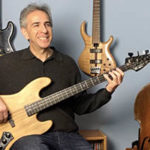And how to avoid “plunking” your way through the music
By Jon Liebman
March 11, 2022
As a bass player, or as someone who’s learning bass, how often do you think about why you play what you play?
Do you consistently choose your notes, your bass lines, your grooves because they genuinely make the music sound better?
Or do you sometimes fall into the trap of playing them, well… because you can? (Be honest now.)
Recently, our own Gary Graff spoke with Dire Straits bassist John Illsley, in a conversation published as this week’s FBPO interview.
During their talk, in addition to recounting some of the Grammy-winning band’s history, recordings, milestones, etc., and talking about his recently released autobiography, Illsley weighed in on the topic of appropriateness for bass players, and the importance of a song-first approach.
Not surprisingly, his take was spot on.
Illsley’s first comment was about how he’s always admired bassists who play economically, with a less-is-more approach, citing John McVie, Tony Garnier, and Pino Palladino among his bass-player influences.
“I think the ones that allowed the space in the music,” he says, “let the music breathe a little bit, those are the ones I liked listening to — still do.”
The reason the use of space in music is so effective is because of the power it has to enhance a song. When you think about it, playing in a band is like having a conversation with others. There’s got to be some give and take. So don’t just play; play for the song.
“It’s all about feel at the end of the day,” Illsley says. “People who just plunk their way through it, it doesn’t make any sense.”
I write about this topic a lot because its significance can’t be overstated. As a bass player, when you lay down the groove for the band, you’ve got to have the big picture in mind. Always.
“You have to respect the song,” says John. “You have to go with the sort of majestic nature of the song, give it the best chance in a way.”
Building your bass technique is important, but it’s a means to an end. The same can be said for learning your scales and modes, interval studies, string-crossing exercises…
Playing fast or trying to show off your newest lick may impress your friends, but it won’t endear you to anyone in the band if you’re only doing it to show off your chops.
Are you doing everything you can to make the music feel good? Are you giving the song what it needs? That’s your job as a bass player. And that’s why we play what we play. In your quest for learning bass, keep that top of mind and you’ll definitely go a lot farther.
Have a thought on the subject? Leave a comment below and let me know what you think. In the meantime, read Gary’s interview with John here.






Interview the bassplayer from Lake Street Dive, she is a great one too.